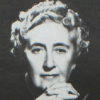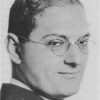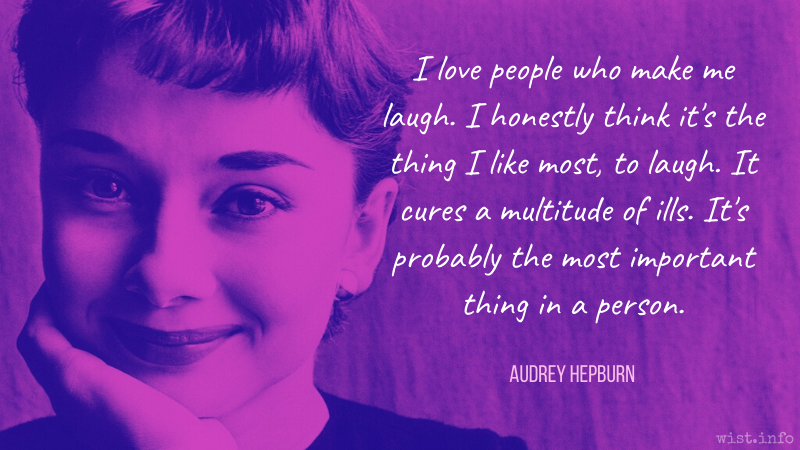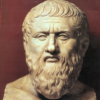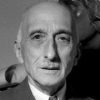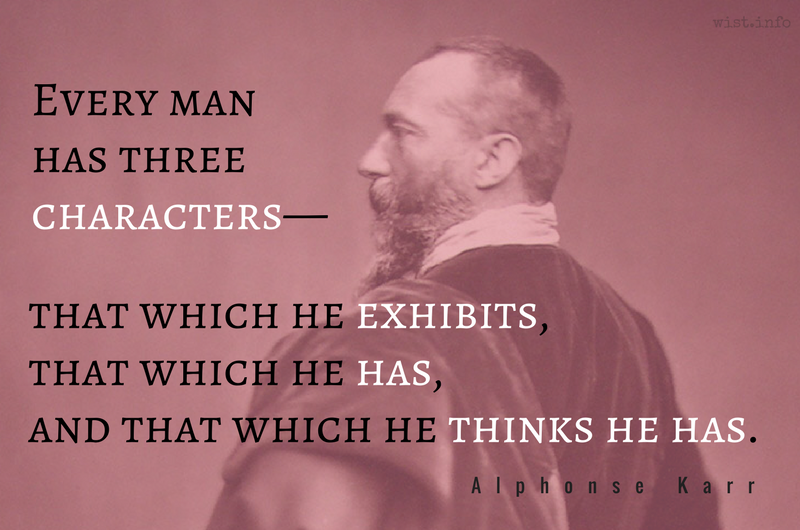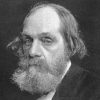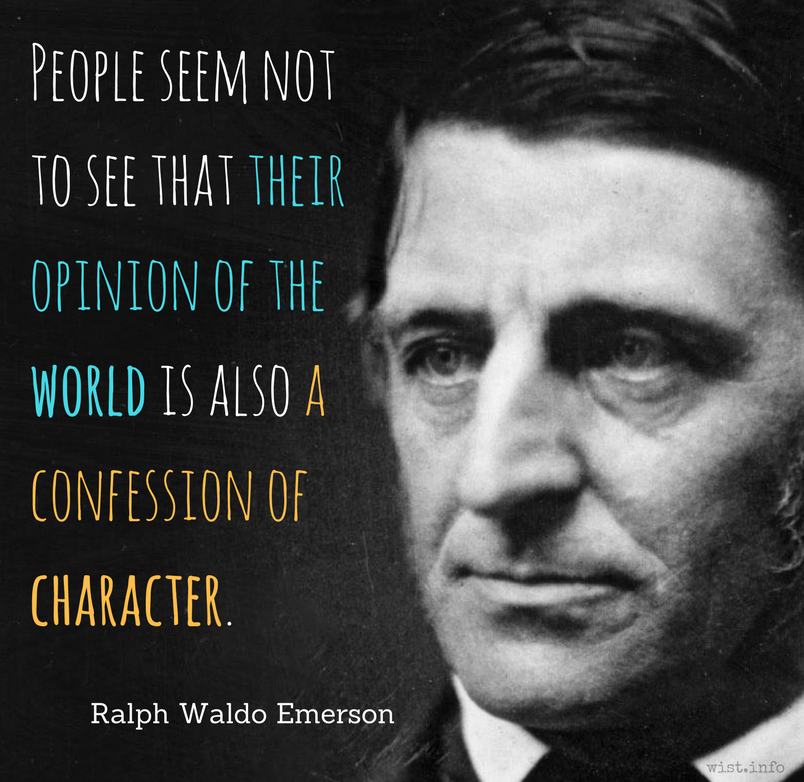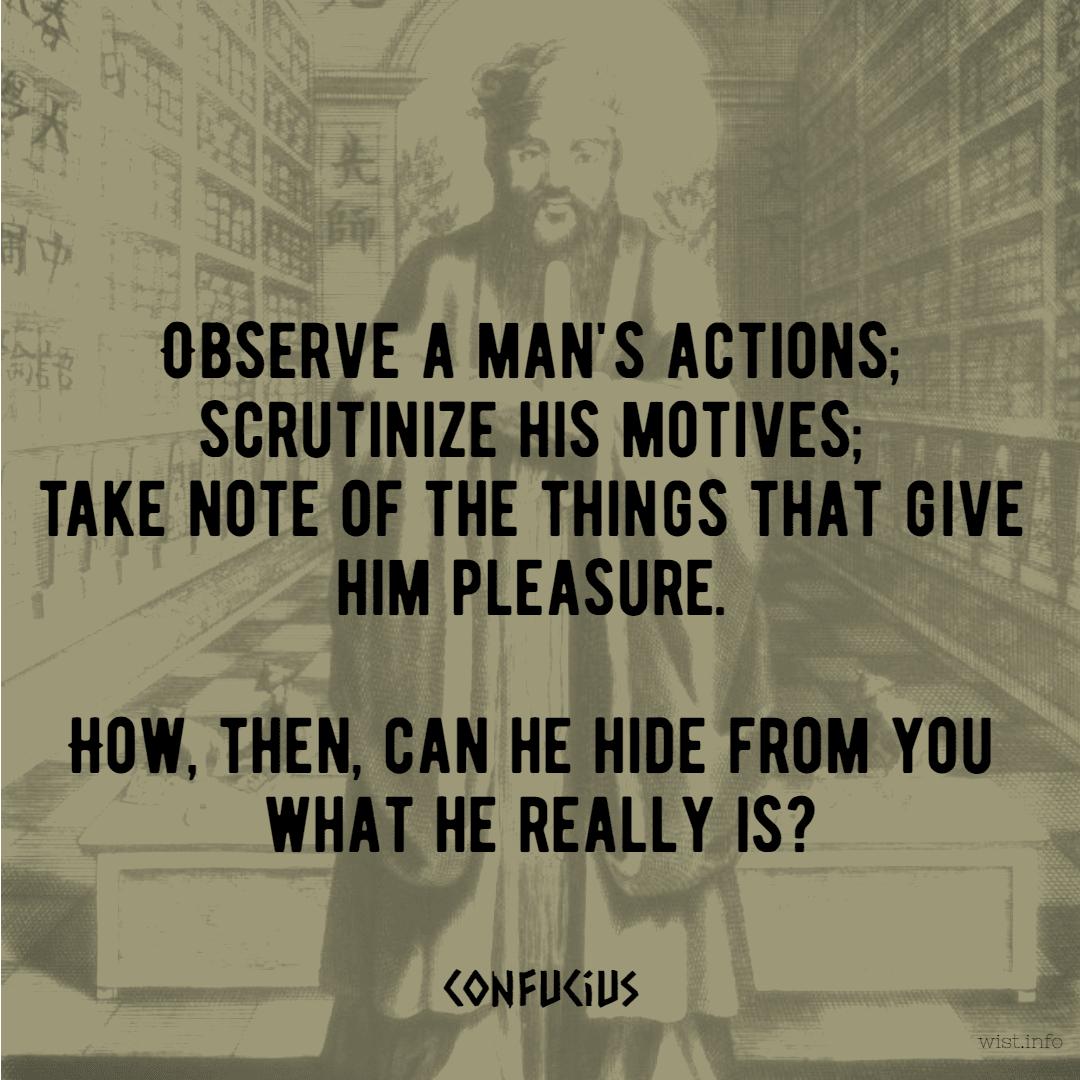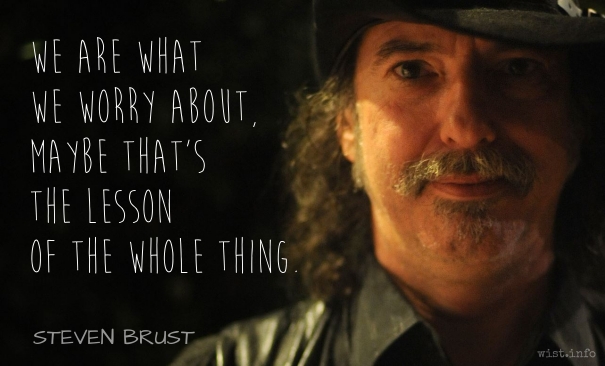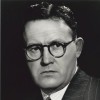For the great law of culture is: Let each become all that he was created capable of being; expand, if possible, to his full growth; resisting all impediments, casting off all foreign, especially all noxious adhesions; and show himself at length in his own shape and stature, be these what they may.
Thomas Carlyle (1795-1881) Scottish essayist and historian
“Jean Paul Friedrich Richter,” Edinburgh Review No. 91, Art. 7 (1827-06)
(Source)
A review of Heinrich Döring, Jean Paul Friedrich Richter's Life, with a Sketch of His Works (1826).
Quotations about:
personality
Note not all quotations have been tagged, so Search may find additional quotes on this topic.
Each friend represents a world in us, a world possibly not born until they arrive, and it is only by this meeting that a new world is born.
In great actions men show themselves as they ought to be, in small actions as they are.
[Dans les grandes choses, les hommes se montrent comme il leur convient de se montrer; dans les petites, ils se montrent comme ils sont.]
Nicolas Chamfort (1741-1794) French writer, epigrammist (b. Nicolas-Sébastien Roch)
Products of Perfected Civilization [Produits de la Civilisation Perfectionée], Part 1 “Maxims and Thoughts [Maximes et Pensées],” ch. 1, ¶ 52 (1795) [tr. Hutchinson (1902), “The Cynic’s Breviary”]
(Source)
(Source (French)). Alternate translations:In great matters men show themselves as they ought; in little, as they are.
[tr. Mathers (1926)]In affairs of importance, men show themselves at their best advantage; in small matters they are seen as they are.
[tr. Merwin (1969)]In great things, men show themselves as they want to be seen; and in little ones they show themselves as they are.
[tr. Siniscalchi (1994)]In important matters, men display themselves as they want to be seen; in minor matters as they really are.
[tr. Parmée (2003), ¶45]
A human being, Hastings, cannot resist the opportunity to reveal himself and express his personality which conversation gives him. Every time he will give himself away.
‘Tis for little Souls, that truckle under the Weight of Affairs, not to know how clearly to disengage themselves, and not to know how to lay them aside, and take them up again.
[C’est aux petites ames ensevelies du poix des affaires, de ne s’en sçavoir purement desmesler : de ne les sçavoir et laisser et reprendre.]Michel de Montaigne (1533-1592) French essayist
Essays, Book 3, ch. 13 “On Experience [De l’Experience]” (1588) (3.13) (1595) [tr. Cotton (1686)]
(Source)
(Source (French)). Alternate translations:It is for base and pettie mindes, dulled and overwhelmed with the weight of affaires, to be ignorant how to leave them, and not to know how to free themselves from them; nor how to leave and take them againe.
[tr. Florio (1603)]’Tis for little souls, that truckle under the weight of affairs, not from them to know how clearly to disengage themselves, not to know how to lay them aside and take them up again.
[tr. Cotton/Hazlitt (1877)]It is for small souls, buried under the weight of affairs, not to know how to free themselves therefrom entirely; not to know how to leave them and return to them.
[tr. Ives (1925)]It is for little souls, buried under the weight of business, to be unable to detach themselves cleanly from it or to leave it and pick it up again.
[tr. Frame (1943)]It is for petty souls overwhelmed by the weight of affairs to be unable to disentangle themselves for them completely, not knowing how to drop them and then take them up again.
[tr. Screech (1987)]
Childhood is a thing that happens so early you don’t forget it. Everything else you grow out of, but you never recover from childhood.
Beryl Bainbridge (1932-2010) English novelist
“Beryl Bainbridge and Her Tenth Novel,” interview by Willa Petschek, New York Times (1981-03-01)
(Source)
In the theater, as in life, we prefer a villain with a sense of humor to a hero without one.
Mignon McLaughlin (1913-1983) American journalist and author
The Neurotic’s Notebook, ch. 7 (1963)
(Source)
It is only in romances that people undergo a sudden metamorphosis. In real life, even after the most terrible experiences, the main character remains exactly the same.
If by the age of forty a man is still disliked there is no hope for him.
[年四十而見惡焉、其終也已。]
Confucius (c. 551- c. 479 BC) Chinese philosopher, sage, politician [孔夫子 (Kǒng Fūzǐ, K'ung Fu-tzu, K'ung Fu Tse), 孔子 (Kǒngzǐ, Chungni), 孔丘 (Kǒng Qiū, K'ung Ch'iu)]
The Analects [論語, 论语, Lúnyǔ], Book 17, verse 26 (17.26) (6th C. BC – AD 3rd C.) [tr. Lau (1979)]
(Source)
(Source (Chinese)). Alternate translations:When a man at forty is the object of dislike, he will always continue what he is.
[tr. Legge (1861)]When a man meets with odium at forty, he will do so to the end.
[tr. Jennings (1895)]If a man after forty is an object of dislike to men, he will continue to be so to the end of his days.
[tr. Ku Hung-Ming (1898)]If a man reach forty and yet be disliked by his fellows, he will be so to the end.
[tr. Soothill (1910)]Forty and disliked. He is at the end already; too late to alter.
[tr. Soothill (1910) - alternate 1]At 40 a man's character is settled, and if he still be detested by his fellows, then here his end is reached.
[tr. Soothill (1910) - alternate 2]If a man is hateful at forty he'll be so to the end.
[tr. Pound (1933)]One who has reached the age of forty and is still disliked will be so till the end.
[tr. Waley (1938)]It is all over for the man of forty who is held in aversion.
[tr. Ware (1950), 17.24]If hateful things are seen in one at the age of forty, that is indeed how one will end up.
[tr. Dawson (1993)]Whoever, by the age of forty, is still disliked, will remain so till the end.
[tr. Leys (1997)]If, at forty, a man is still loathed, he is done for.
[tr. Huang (1997), 17.25]If one is still disliked at his forty years of age, one is going to the end.
[tr. Cai/Yu (1998), No. 466]The person who at age forty still evokes the dislike of others is a hopeless case.
[tr. Ames/Rosemont (1998)]If he is forty and is still hated, he will probably be so until the end.
[tr. Brooks/Brooks (1998), 17.24]If you reach forty and find it all hateful, you'll be that way to the death.
[tr. Hinton (1998), 17.25]If, having reached the age of forty, you still find yourself despised by others, you will remain despised until the end of your days.
[tr. Slingerland (2003)]Forty and hated by others -- and he’ll be so the rest of his life.
[tr. Watson (2007)]If a person has reached forty but is still an outcast, he will not have much hope for the rest of his life.
[tr. Li (2020)]
A stone lies in a river; a piece of wood is jammed against it; dead leaves, drifting logs, and branches caked with mud collect; weeds settle there, and soon birds have made a nest and are feeding their young among the blossoming water plants. Then the river rises and the earth is washed away. The birds depart, the flowers wither, the branches are dislodged and drift downward; no trace is left of the floating island but a stone submerged by the water; — such is our personality.
Cyril Connolly (1903-1974) English intellectual, literary critic and writer.
The Unquiet Grave, Part 1 “Ecce Gubernator” (1944)
(Source)
I am quite sure I am not a great novelist because I’ve only got down onto paper really three types of people: the person who I think I am, the people who irritate me, and the people I’d like to be. When you get to the really great people like Tolstoy, you find they can get hold of all types, but most novelists, including myself, are much more constricted in their imaginations and their sympathies.
E. M. Forster (1879-1970) English novelist, essayist, critic, librettist [Edward Morgan Forster]
“E. M. Forster,” Modern Writers: Interviews with Remarkable Authors, BBC (21 Dec 1958)
(Source)
Gross and obscure natures, however decorated, seem impure shambles; but character gives splendor to youth, and awe to wrinkled skin and gray hairs.
Ralph Waldo Emerson (1803-1882) American essayist, lecturer, poet
Essay (1860), “Beauty,” The Conduct of Life, ch. 8
(Source)
Based on a course of lectures by that name first delivered in Pittsburg, 1851-03.
A transition from an author’s book to his conversation is too often like an entrance into a large city after a distant prospect. Remotely, we see nothing but spires of temples, and turrets of palaces, and imagine it the residence of splendor, grandeur, and magnificence; but when we have passed the gates, we find it perplexed with narrow passages, disgraced with despicable cottages, embarrassed with obstructions, and clouded with smoke.
Samuel Johnson (1709-1784) English writer, lexicographer, critic
The Rambler, #14 (5 May 1784)
(Source)
Sport strips away personality, letting the white bone of character shine through. Sport gives players an opportunity to know and test themselves.
At fifteen you had the radiance of early morning, at twenty you will begin to have the melancholy brilliance of the moon, and when you are my age you will give out, as I do, the genial golden warmth of 4 P.M.
F. Scott Fitzgerald (1896-1940) American writer [Francis Scott Key Fitzgerald]
This Side of Paradise, Book 1, ch. 3 [Darcy] (1920)
(Source)
“He’s a fair man.”
I looked at him, startled.
“I said fair,” he repeated. “Not likable.”
Physics is, hopefully, simple. Physicists are not.
Edward Teller (1908-2003) Hungarian-American theoretical physicist
Conversations on the Dark Secrets of Physics, ch. 10 (1991) [with Wendy Teller and Wilson Talley]
(Source)
About six months ago, he stopped recognizing me. Now I no longer recognize him.
The way you wear your hat,
The way you sip your tea,
The mem’ry of all that —
No, no! They can’t take that away from me!Ira Gershwin (1896-1983) American lyricist [b. Israel Gershowitz]
“They Can’t Take That Away from Me”, Shall We Dance (1937)
(Source)
It isn’t easy for an author to remain a pleasant human being: both success and failure are usually of a crippling kind.
Graham Greene (1904-1991) English novelist [Henry Graham Greene]
“The Poker-Face,” The Spectator (15 Oct 1943)
(Source)
Reprinted in The Lost Childhood and Other Essays (1951).
I love people who make me laugh. I honestly think it’s the thing I like most, to laugh. It cures a multitude of ills. It’s probably the most important thing in a person.
Audrey Hepburn (1929-1993) Belgian-English actress
“Hepburn Heart,” Interview with Dominick Dunne, Vanity Fair (May 1991)
(Source)
You can discover more about a person in an hour of play than in a year of conversation.
Plato (c.428-347 BC) Greek philosopher
(Spurious)
Frequently attributed to Plato, starting in the 1950s, but not found in his works. Earliest citation is as a Portuguese proverb, in A Polyglot of Foreign Proverbs, tr. Henry G. Bohn (1857): "Mais descobre huma hora de jogo, que hum anno de conversação." For more see here.
For the whole thing about matrimony is this: We fall in love with a personality, but we must live with a character. Behind the pretty wallpaper and the brightly painted plaster lurk the yards of tangled wire and twisted pipes, ready to run a short or spring a leak on us without a word of warning.
Peter De Vries (1910-1993) American editor, novelist, satirist
Mrs. Wallop (1970)
(Source)
Often misquoted as "The difficulty with marriage is that ..."
But in the main, I feel like a brown bag of miscellany propped against a wall. Against a wall in company with other bags, white, red and yellow. Pour out the contents, and there is discovered a jumble of small things priceless and worthless. A first-water diamond, an empty spool, bits of broken glass, lengths of string, a key to a door long since crumbled away, a rusty knife-blade, old shoes saved for a road that never was and never will be, a nail bent under the weight of things too heavy for any nail, a dried flower or two still a little fragrant.
In your hand is the brown bag. On the ground before you is the jumble it held — so much like the jumble in the bags, could they be emptied, that all might be dumped in a single heap and the bags refilled without altering the content of any greatly. A bit of colored glass more or less would not matter. Perhaps that is how the Great Stuffer of Bags filled them in the first place — who knows?
Zora Neale Hurston (1891-1960) American writer, folklorist, anthropologist
“How It Feels to Be Colored Me”, The World Tomorrow (May 1928)
(Source)
Every man has three characters — that which he exhibits, that which he has, and that which he thinks he has.
Alphonse Karr (1808-1890) French journalist and novelist
A Tour Round My Garden [Voyage autour de mon jardin] (1851)
(Source)
As you grow older, you’ll see white men cheat black men every day of your life, but let me tell you something and don’t you forget it — whenever a white man does that to a black man, no matter who he is, how rich he is, or how fine a family he comes from, that white man is trash.
An individual has not begun to live until he can rise above the narrow horizons of his particular individualistic concerns to the broader concerns of all humanity. And this is one of the big problems of life, that so many people never quite get to the point of rising above self. And so they end up the tragic victims of self-centeredness. They end up the victims of distorted and disrupted personality.
Martin Luther King, Jr. (1929-1968) American clergyman, civil rights leader, social activist, preacher
“Conquering Self-Centeredness,” sermon, Dexter Avenue Baptist Church, Montgomery, Alabama (11 Aug 1957)
(Source)
We should not be too hasty in bestowing either our praise or censure on mankind, since we shall often find such a mixture of good and evil in the same character, that it may require a very accurate judgment and a very elaborate inquiry to determine on which side the balance turns.
Henry Fielding (1707-1754) English novelist, dramatist, satirist
The Life and Death of Jonathan Wild, the Great, Vol. 5 (1743)
(Source)
People seem not to see that their opinion of the world is also a confession of character.
Ralph Waldo Emerson (1803-1882) American essayist, lecturer, poet
“Worship,” The Conduct of Life, ch. 6 (1860)
(Source)
Character is higher than intellect.
Ralph Waldo Emerson (1803-1882) American essayist, lecturer, poet
“The American Scholar,” sec. 3, speech, Phi Beta Kappa Society, Cambridge (1837-08-31)
(Source)
What you get by reaching your goals is not nearly so important as what you become by reaching them.
Hilary Hinton "Zig" Ziglar (1926-2012) American author, salesperson, motivational speaker
Biscuits, Fleas, and Pump Handles (1974)
Ziglar used multiple variations of this phrase. Also attributed to Goethe and Thoreau. For more discussion see here.
Observe a man’s actions; scrutinize his motives; take note of the things that give him pleasure. How, then, can he hide from you what he really is?
[視其所以。觀其所由。察其所安。人焉廋哉、人焉廋哉]
Confucius (c. 551- c. 479 BC) Chinese philosopher, sage, politician [孔夫子 (Kǒng Fūzǐ, K'ung Fu-tzu, K'ung Fu Tse), 孔子 (Kǒngzǐ, Chungni), 孔丘 (Kǒng Qiū, K'ung Ch'iu)]
The Analects [論語, 论语, Lúnyǔ], Book 2, verse 10 (2.10) (6th C. BC – AD 3rd C.) [tr. Giles (1907)]
(Source)
(Source (Chinese)). Alternate translations:See what a man does. Mark his motives. Examine in what things he rests. How can a man conceal his character? How can a man conceal his character?
[tr. Legge (1861)]If you observe what things people (usually) take in hand, watch their motives, and note particularly what it is that gives them satisfaction, shall they be able to conceal from you what they are? Conceal themselves, indeed!
[tr. Jennings (1895)]You look at how a man acts; consider his motives; find out his tastes. How can a man hide himself; how can he hide himself from you?
[tr. Ku Hung-Ming (1898)]Observe what he does; look into his motives; find out in what he rests. Can a man hide himself! Can a man hide himself!
[tr. Soothill (1910)]Watch a man’s means, what and how. See what starts him. See what he is at ease in. How can a man conceal his real bent?
[tr. Pound (1933)]Look closely into his aims, observe the means by which e pursues them, discover what brings him content -- and can the man's real worth remain hidden from you, can it remain hidden from you?
[tr. Waley (1938)]Look at the means which a man employs; consider his motives; observe his pleasures. A man simply cannot conceal himself!
[tr. Ware (1950)]Observe a man's actions; scrutinize his motives; and study what makes him content. How can a man conceal himself?
[tr. Chai (1965)]Look at the means a man employs, observe the path he takes and examine where he feels at home. In what way is a man's true character hidden from view? In what way is man's true character hidden from view?
[tr. Lau (1979)]See how he operates, observe what path he follows, examine what his is satisfied with, and how can a man remain inscrutable, how can a man remain inscrutable!
[tr. Dawson (1993)]Find out why a man acts, observe how he acts, and examine where he finds his peace. Is there anything he could still hide?
[tr. Leys (1997)]See what a man does; contemplate the path he has traversed; examine what he is at ease with. How, then, can he conceal himself? How, then, can he conceal himself?
[tr. Huang (1997)]See what a man does; contemplate the path he has traversed; examine what he is at ease with. How, then, can he conceal himself?
[tr. Huang (1997)]Watching one's action, examining one's experience, and observing one's favorite. What could one hide? What could one hide?
[tr. Cai/Yu (1998)]Watch their actions, observe their motives, examine wherein they dwell content; won't you know what kind of person they are? Won't you know what kind of person they are?
[tr. Ames/Rosemont (1998)]See what he bases himself on, observe what he follows, find out what he si comfortable with. Where can the man hide? Where can the man hide?
[tr. Brooks/Brooks (1998)]If you look at their intentions, examine their motives, and scrutinize what brings them contentment -- how can people hide who they are? How can they hide who they really are?
[tr. Hinton (1998)]Look at the means a man employs, observe the basis from which he acts, and discover where it is that he feels at ease. Where can he hide? Where can he hide?
[tr. Slingerland (2003)]Watch what he does, observe the path he follows, examine where he comes to rest -- can any person then remain a mystery? Can any person remain a mystery?
[tr. Watson (2007)]Observe [shi] what a man does. Look into [guan] what he has done [you]. Consider [cha] where he feels at home. How then can he hide his character?
[tr. Chin (2014)]You observe the motivation of a person's behavior and words, the approach and directions he follows, and his mental and emotional conditions. What can he hide? What can he hide?
[tr. Li (2020)]
We begin to notice, besides our particular sinful acts, our sinfulness; begin to be alarmed not only about what we do, but about what we are. This may sound rather difficult, so I will try to make it clear from my own case. When I come to my evening prayers and try to reckon up the sins of the day, nine times out of ten the most obvious one is some sin against charity; I have sulked or snapped or sneered or snubbed or stormed. And the excuse that immediately springs to my mind is that the provocation was so sudden and unexpected; I was caught off my guard, I had not time to collect myself.
Now that may be an extenuating circumstance as regards those particular acts: they would obviously be worse if they had been deliberate and premeditated. On the other hand, surely what a man does when he is taken off his guard is the best evidence for what sort of a man he is? Surely what pops out before the man has time to put on a disguise is the truth? If there are rats in a cellar you are most likely to see them if you go in very suddenly. But the suddenness does not create the rats: it only prevents them from hiding. In the same way the suddenness of the provocation does not make me an ill-tempered man; it only shows me what an ill-tempered man I am. The rats are always there in the cellar, but if you go in shouting and noisily they will have taken cover before you switch on the light.
C. S. Lewis (1898-1963) English writer, literary scholar, lay theologian [Clive Staples Lewis]
Mere Christianity, “Let’s Pretend” (1952)
(Source)
You must look into people, as well as at them. Almost all people are born with all the passions, to a certain degree; but almost every man has one prevailing one, to which the others are subordinate. Search every one for that ruling passion; pry into the recesses of his heart, and observe the different workings of the same passion in different people; and when you have found out the prevailing passion of any man, remember never to trust him where that passion is concerned. Work upon him by it, if you please; but be upon your guard yourself against it, whatever professions he may make you.
Lord Chesterfield (1694-1773) English statesman, wit [Philip Dormer Stanhope]
Letter to his son, #112 (4 Oct 1746)
(Source)
He’s a good person, you know. In spite of many things, including his own opinion, he’s a good person. Maybe a bit conceited, overbearing, and arrogant, but then, people without a trace of these diseases aren’t usually worth one’s time.
One sure window into a person’s soul is his reading list.
Mary B. W. Tabor (b. 1964) American journalist [Mary Britt Wellford Tabor]
“Book Notes,” New York Times (14 Jun 1995)
(Source)
Keep your thoughts positive because your thoughts become your words.
Keep your words positive because your words become your behavior.
Keep your behavior positive because your behavior becomes your habits.
Keep your habits positive because your habits become your values.
Keep your values positive because your values become your destiny.
To understand the heart and mind of a person, look not at what he has already achieved, but at what he aspires to.
Kahlil Gibran (1883-1931) Lebanese-American poet, writer, painter [Gibran Khalil Gibran]
(Attributed)
(Source)
Beauty loses its relish; the Graces, never: After the longest acquaintance, they are no less agreeable than at first.
Henry Home, Lord Kames (1696-1782) Scottish jurist, agriculturalist, philosopher, writer
Introduction to the Art of Thinking, ch. 4 (1761)
(Source)
HAL: Presume not that I am the thing I was;
For God doth know — so shall the world perceive —
That I have turn’d away my former self.William Shakespeare (1564-1616) English dramatist and poet
Henry IV, Part 2, Act 5, sc. 5, l. 60ff (5.5.60-62) (c. 1598)
(Source)
And I wanted someone who is absolutely and utterly powerful. It’s interesting because at the time, John Byrne had just taken over Superman and had announced that he was making Superman less powerful because he had become too powerful and you couldn’t write interesting stories about people that were too powerful. That started me thinking, “Well, no, actually you can, because what makes a person interesting or not interesting isn’t how powerful they are, but who they are.
HENRY: A speaker is but a prater, a rhyme is but a ballad, a good leg will fall, a straight back will stoop, a black beard will turn white, a curled pate will grow bald, a fair face will wither, a full eye will wax hollow, but a good heart, Kate, is the sun and the moon, or rather the sun and not the moon, for it shines bright and never changes but keeps his course truly. If thou would have such a one, take me.
To be thoroughly good-natured, and yet avoid being imposed upon, shows great strength ov character.
Josh Billings (1818-1885) American humorist, aphorist [pseud. of Henry Wheeler Shaw]
Everybody’s Friend, Or; Josh Billing’s Encyclopedia and Proverbial Philosophy of Wit and Humor, ch. 157 “Affurisms: Hot Korn” (1874)
(Source)
He was a one-book man. Some men have only one book in them; others, a library.
Sydney Smith (1771-1845) English clergyman, essayist, wit
Memoir of the Reverend Sydney Smith, by His Daughter, Lady Holland, Vol. 1, ch. 11 (1855)
(Source)
‘A good heart will help you to a bonny face, my lad,’ I continued, ‘if you were a regular black; and a bad one will turn the bonniest into something worse than ugly.’
Emily Brontë (1818-1848) British novelist, poet [pseud. Ellis Bell]
Wuthering Heights, ch. 7 [Nelly to Heathcliff] (1847)Full text.
Every body and every thing conspire to make me as contented as possible in it; yet I have seen too much of the vanity of human affairs, to expect felicity from the splendid scenes of public life. I am still determined to be cheerful and to be happy, in whatever situation I may be; for I have also learnt, from experience, that the greater part of our happiness or misery depends upon our dispositions, and not upon our circumstances. We carry the seeds of the one or the other about with us, in our minds, wheresoever we go.
Martha Washington (1731-1802) American socialite, wife of George Washington, First Lady (1789-1797)
Letter to Mercy Otis Warren (1789-12-26)
(Source)
Do I contradict myself?
Very well then I contradict myself,
(I am large, I contain multitudes.)Walt Whitman (1819-1892) American poet
“Song of Myself,” sec. 51, ll. 1324-26, Leaves of Grass, Book 3 (1855)
(Source)




